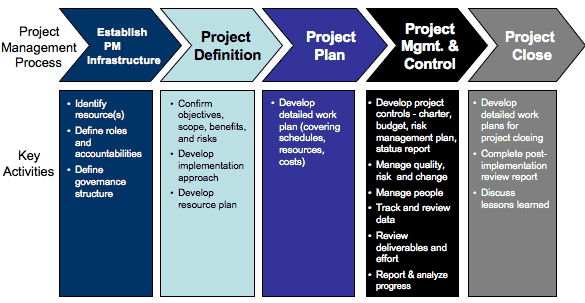Amberhill Associates are project managers who are available on a contract or interim basis to support your key engineering or technology projects. We specialize in managing technology development projects.
Commercially aware and business savvy we are customer focused project managers who can “hit the ground running” and provide essential interim support for your key projects.

What is a Project ?
A project may be large or small, simple or complex but all projects share three common attributes:-
• Specific Outcomes – the project is set up to deliver some specific results or outputs.
• Defined Start & End dates – The project starts and finishes on pre-defined dates.
• Budget – the project has a pre-defined budget which it should not exceed
What is the Project Management process.
There are a multitude of definitions of the project management process but all of them share the attributes shown below:-
The Project Management Process
1) Establish the Project Management Infrastructure.
In order to successfully deliver the project objectives the following steps have to be completed.
a) Identify resources in terms of people, materials, equipment and documentation, this will normally be done with the aid of a preliminary project plan.
b) Define roles and accountability’s – the key personnel need to be identified and their responsibilities assigned.
c) The governance structure needs to be established so that the people involved in the project understand the reporting structure and their place in it.
2) Establish the Project definition.
a) Confirm the project objectives, benefits, risks and scope. A poorly defined project is doomed to failure whereas a properly
<A HREF=”http://ws.amazon.co.uk/widgets/q?ServiceVersion=20070822&MarketPlace=GB&ID=V20070822%2FGB%2Famberhassoci-21%2F8003%2F6c2c499d-697d-425d-ae43-8428ca5298de&Operation=NoScript”>Amazon.co.uk Widgets</A>
defined project will proceed much more smoothly and efficiently.
b) Developing the implementation approach – how is the project to be managed through the process.
c) Develop the resource plan – putting the resources identified in the previous phase in place to guarantee success of the project.
3) Establish the Project Plan.
a) Develop a detailed work plan including schedule, resource and cost. It is absolutely critical that this plan is developed carefully to a task-individual resource level. It has been estimated that for a project to be successful 70% of the Project Managers effort should go on developing the Project Plan. This plan should include Critical Path Analysis to ensure the shortest overall timescale. Project Planning is a major skill on the part of the Project Manager and any effort skimped at this stage of the project will cost dearly later. At projectsguru.co.uk we have many years experience using Microsoft Project which is our preferred tool for project planning.
c) Every task should have the commitment of the resource allocated to it. This negotiation is another skill of the project manager.
4) Project Management and Control.

Only the naive believe any project delivers itself. The project requires careful management and control to ensure success:-
a) Useful tools to employ are:-
i) Risk Matrix – absolutely essential to identify, manage and mitigate against project risk.
ii) Charter – what is this project going to do, business case, who’s involved.
iii) Budget – what will it cost & when.
iV) Form and regularity of Managerial Reports.
b) Management of quality – are the outputs meeting expectations. Are Change Management techniques employed.
c) People Management – every project involves people and the project manager needs all the skills of people management.
d) Track & Review data – The project manager needs to develop Key Performance Indicators to ensure that success can be managed and reported effectively.
e) Review deliverables and effort – regular team meetings will be required. to review project progress.
f) Report and analyze progress – careful and regular review of the project plan progress v’s actual & reporting.
5) Project Closure.
It is important to make sure all the loose ends are tied and the project closed down properly by:-
a) Ensure the plan includes all the tasks need for proper closure.
b) Complete a post implementation report including a review of what went well and not so well (post mortem)
The Role of the Project Manager.
The role of the project manager is a challenging one. Often he or she will be coordinating the activities of technical highly skilled people and liaising with internal and external parties all critical to project delivery. Project Management is a highly skilled professional role and the Project Manager will normally need several years experience in order to be successful.
The role involves the key tasks of planning, organizing and controlling. In complex projects planning project tasks often involves the use of software programs such as Microsoft Project which enables the Project Manager to schedule hundreds of tasks and manipulate their interdependancy’s in order to reduce the overall timescale of the project.
Organizing involves dealing with people within the immediate project team as well as third parties internal and external to the wider organization.
Controlling involves monitoring and measuring outputs and exerting influence to achieve the desired outcomes.
In order to be effective the Project Manager needs information, communication and commitment.
How we can help
With many years experience managing projects projectsguru can provide support in any aspect of the project management process.
We can supplement your own project management resource or provide a skilled, experienced project manager to work with your team and manage your key project.
We can provide a dedicated project manager on a short term contract to support your key project.

